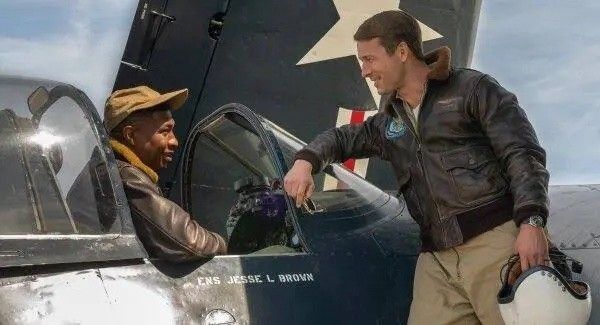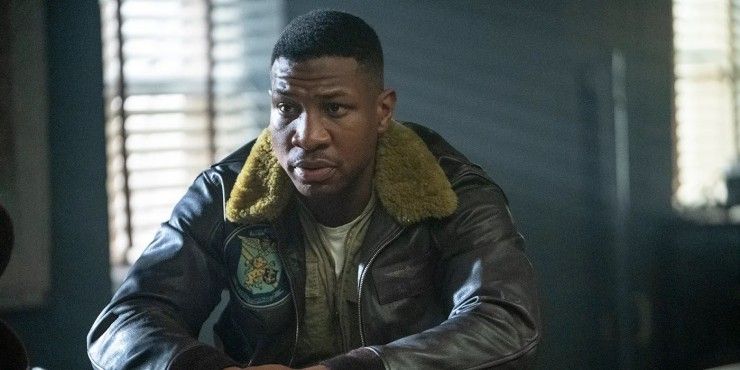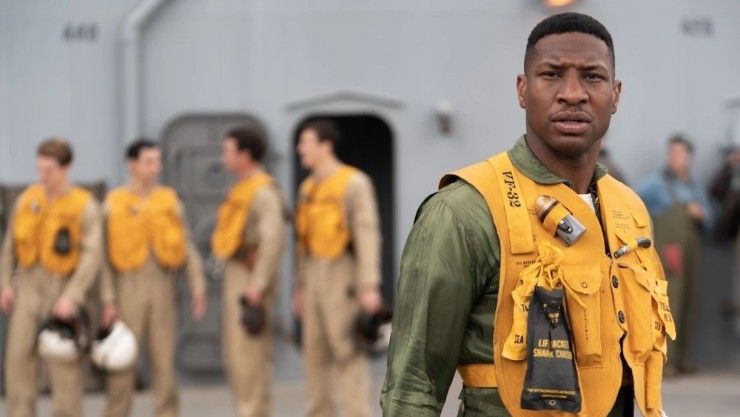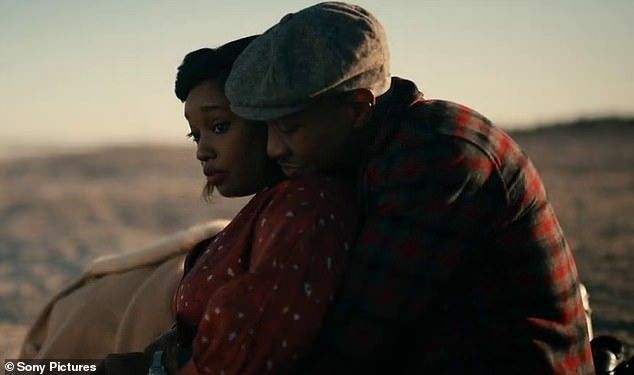
Editor Billy Fox tells us about cutting Devotion, collaborating with J.D. Dillard, and finding your voice through the edit.
In J.D. Dillard’s upcoming film, Devotion, we meet Jesse Brown (Jonathan Majors), the first Black man to complete the U.S. Navy’s basic flight training program. During the Korean War, he proves himself to be an exceptional pilot, but the main story revolves around each characters’ devotion to their friends, family, and their love of flying. Based on the book, Devotion: An Epic Story of Heroism, Friendship, and Sacrifice by Adam Makos, the movie brings to life a story people have only heard about.
Editing a massive feature that involves multiple dog fights and interwoven storylines and finding that balance between two genres is no easy feat for editor Billy Fox. With his extensive and outstanding career in film and TV, Fox was ready to tackle the challenge and showcase his devotion to creating epic dramas that are made for the big screen.
Fox was able to sit down with No Film School via Zoom to talk about his work on the major blockbuster epic, Devotion.
Editor's note: This interview has been edited for length and clarity.
No Film School: How did you end up becoming the editor for Devotion? What were the factors and attributes that led you to be hired for this job?
Billy Fox: I believe I was hired on this film because I had worked with Black Label, who were the producers of the movie, and I had worked with them on Only the Brave, the firefighter movie in Arizona. I got a phone call from Bruce Franklin, who was a line producer, and he asked if I'm interested in it and I said, "Well, yeah, and send me a script." I read it and I had met the director before, J.D. Dillard, and we were both working on a Blumhouse movie. He had one and I was cutting one next to each other actually, different movies. I had met him before and I spread the script and loved it.
NFS: Did you find it surprising from when you first read the script compared to what the end result was? Was there a drastic difference or anything?
Fox: I didn't know what the budget of the movie was, and I read this script with airplanes falling off aircraft carriers and all of this stuff happening and I'm going, "Oh my God, this is a really big film. And I wonder what the budget is."
I mean, they built an aircraft carrier in Georgia. There was a landing strip. They built an entire aircraft carrier. They used the runway as the aircraft carrier, and they built the whole calming tower. Then it was put into the ocean. There were some pretty astounding visual effects and there were a lot of visual effects in the movie. We had about a thousand visual effects.
It was also a film that had so much drama and my assistant, Russell, actually did a calculation of action to drama, and that percentage was about 35%. Sometimes you see these action movies and they're considerably higher in action and this felt good because it had enough emotion to make you feel connected to the characters.
NFS: Devotion is based on a true story. How do you find that pacing and tone in a true story, especially when there is action involved in this heavy drama?
Fox: You do have to be true to the story. And, of course, there is a degree of dramatic license in certain areas, and there are certain situations where no one knows what really happened in a given event because no one is alive to actually document it. I had a similar situation when I did Band of Brothers, which was a true story.
We lived in the same confines of its drama and it's a story about people and we have to stay true to the real event. When we did in the case of Band of Brothers, we showed it to some of the veterans that were still alive at that time, and they were amazed. They were amazed that it was so accurate. On Devotion, we showed it to the family, the sons, and the varying members of the family, and they really appreciated the authenticity of the story.
It's a big responsibility, particularly for a J.D. that wants approval from the family, wants to make sure that it's true to the way they remember it and he doesn’t want a story that disrespected the family member in any way. In this case, they were all just over the moon thrilled with how it turned out.

NFS: In terms of advancing the film from its earliest assembly to the final cut, what were your goals as an editor?
Fox: As an editor, the editor's cut or assembly is something that I always strive to present to a director as a finished movie as much as it can be finished at that time. And that means that the edit is very tight and very polished. The sound effects are very much in there and polished. The music is in there, it's got the studio logos at the beginning. It has closing credits at the end.
For the director to sit down and take a look at it, they're really watching a movie, of course, it's just a starting place. But then you move from the editor's cut into the director's cut and it grows and it grows as you move on down the path to the producer’s cut and then your previews and on and on. But I always want to present to the director the first version of it, and, hopefully, I get most of it right.
There are times the director will look at something and go, "Well, that's not exactly as I had in mind," but you have to take those chances. Some directors I work with are looking at cuts as they're shooting and I'm sending that person cuts. Most of my directors are busy and can’t watch the cuts. It's a combination of two things. They're so busy shooting and they have a certain confidence in what they've shot. They know what they have and they know what they have in their mind and they're good. They don't need to see it cut and they will have plenty of time to change anything and everything that they have the desire to change.
NFS: When working with J.D. on this project, you presented him the editor's cut, and then you guys went back in together to work on the director's cut. What was that collaboration like when you were editing things together?
Fox: You pretty much just start at the top. Well, no, I take that back. In theory, you start at the top and you start with scene one. There are times when he'll make some changes and sometimes he'll make a lot of changes, and sometimes he'll look at a scene and go, "This looks great, let's just move on for now. I have some things I'd like to address later, but for right now, let's just keep on going."
It depends on the scene. It depends on how much I hit the mark in terms of what the director had in mind. There is the factor we had this on Only The Brave, and we did this on Devotion, where we had to start backward because there were so many visual effects and they needed to get their hands on those effects. We did the big finale first because we needed to turn that over to visual effects, so we started at the end of the movie, and worked on that scene until it was in good shape. Then we went and did the two or three other big action scenes and got those in good shape, handed those off to visual effects, then we went back to the top.
It was kind of nice because you knew that those things were done. That doesn't mean that we're done with them. You knew you were about to hit one of those things you had already gone through. I mean, we're still polishing and tweaking and tightening and “Let's take that out,” “Let's put that back in.”
We had a really solid first cut. Then you go to the top and you start going through it, not really concerned at all about length. It's like, let's take every scene in the movie and make it the best it can be. If in fact, we end up trimming part of it or even trimming out the whole, it doesn't matter, let's just get it in good shape and we'll keep coming in. The next pass is when we start dealing with length.

NFS: Some of those scenes I imagine being extremely hard to edit together, especially those dog fight sequences in the air. How do you make sure the audiences understand what's happening and what matters in those scenes when we can't really clearly distinguish who is who always?
Fox: There were a couple of things. A good example would be what we call canyon run, where the MiGs behind Jesse and Tom are going down another canyon. A lot of that, I was just kind of guessing at how to tell that story and I had a version of it, but it really was extremely helpful to get J.D. in the room. He would go, "No, no, no, no, I have a particular shot that helps that particular transition," and that's what it's designed for. It didn't really indicate that in the script notes. It doesn't say that's what this shot is for. So it would help.
Things like the dog fight or some of those battle scenes, I do the best I can to try and figure it out. There are times with some other directors that when a scene is really complicated, not so much an action thing, but like a dream sequence or something that's in the director's head, I don't even try to mess around. I don't even try to waste time because I might be right, likely I'm wrong. I just wait until the director's there and we do it together. So I attack each one differently, but most of the time, 95% of the time, I definitely go and cut the scene with the material I'm handed.
NFS: What would be the most difficult scene from Devotion for you to cut?
Fox: Some of those action sequences, the canyon run, it just was a ballet of one guy going down the canyon and one guy going in opposite directions, ultimately coming together where Tom takes out the MiG. Getting the timing of that to work right was a challenge.
I was going to say, the other challenge we definitely had was the fact that it was COVID. My first assistant, Russell, and J.D. granted we had Zoomed many times and talked on the phone, but I'd never met them in person. I mean, that's not entirely true because I had met J.D. years before. It was very interesting when we were going, certainly through the editor's cut and then two-thirds of the director's cut. I'm sitting in my room somewhere and J.D. somewhere else, Russell's somewhere else, the other assistant is somewhere else and we're on screens. It was an interesting experience. It worked extremely well.
NFS: I'm very interested in that whole process because you guys are all separate yet you have to have that constant and clear communication. Are there any tips you would give to people who are working more remotely when they're editing a film?
Fox: Well, the thing that's interesting is I've edited at home, not everything I do, but probably half of all the films. Almost all my editor's cuts are edited at home. In my work with Craig Brewer, we edit the whole movie at my house from the first day of dailies to turning it over for the final cut. The whole thing is done at the house.
So I've been doing that for a very long time. But in terms of the collaboration work, part of your team is in some other locale, the technology really wasn't there to accomplish it. There were ways you could do it kind of, but it was pretty ugly. There are a number of systems, Evercast, of course, is probably the most famous.
It's not that COVID caused the invention of that software. It was in development and was starting to function just before COVID came around. I had never used Evercast before. And I'm going, "Is this going to be efficient? Is this going to be frustrating? Is this going to be a pain in the butt? What is this going to be like?" I will say, it was fantastic. We had a ball, we got a lot done. We basically maintained the same pace that we would normally get done on a daily basis that I'm used to if the director was sitting right here next to me.
NFS: Would you do it again like that?
Fox: Without a doubt. I'm working on a movie right now, and we're not having to do it for COVID reasons, but we are using three different collaboration software that allows us to be anywhere and you don't have to be in the same locale.
And look, [the studios] have a concern of piracy and the security of the material, and that's a real concern. So you have to respect that and you have to take whatever steps the studio wants you to do to make sure that the footage doesn't get out or someone taps into your system and you have to be careful of that kind of stuff.

NFS: What is the editing software you used for Devotion?
Fox: On Devotion, we used Adobe Premiere.
NFS: What was it about Adobe Premiere that you believe really worked for your editing process?
Fox: Sure. I always evaluate all the pieces that are in front of me, from monitors to speakers, to mixing consoles to everything. I had been keeping my eye on [Adobe], this is about five, six years ago, I think Only the Brave was our first. I had been watching Adobe. I was certainly familiar with it. I started to look at it and had talks with people at Adobe and I went, "You know what? There are some advantages to this software that I think could apply." I decided, and I talked to the director of Only the Brave, Joseph Kosinski, and said, "This is what I would like to use." And he goes, "That's great, let's do it."
So I attack it on a per-job basis. On some shows, the other system could be the right system for that show. Then on the next show, maybe Premiere. So I look at it on a per-show basis, but Adobe Premiere worked perfectly for Devotion and we had a ball with it. The power of what it did and more importantly, how it thinks and how its processes fit quite perfectly with my flow. Oftentimes in some other systems, I feel like I'm trying to get my head into another piece of software and it just doesn't fit as well. Premiere, I'm very comfortable with.
NFS: I like that you listen to your gut.
Fox: I had a producer that I did a cut for a TV show actually. It was good. I felt it and I handed it off and one of the producers saw it that night and he came in, he sat next to me, and he was going to tell me what he thought of the cut. I asked, "So what did you think?" He looked at me and it was one of those times when he started a sentence and I knew where he was going as the first word came out, he goes, "Good cut. It was really solid." I go, "Uh-huh. Okay, what's next?" And he goes, "You didn't dig deep enough. You didn't listen to yourself." And I went, "You're right."
And I was supposed to deal with the director later that day. I said, "Can you get the director? Tell him I'll start tomorrow." He goes, "Done,” and he leaves. I sat there until midnight that night and just re-looked at everything I did because it's all based upon. Editing isn't done with your eyes, your brain, or your fingers. It's done with your gut. The decisions you make are not about continuity, it's not about positions of people and where the door is, none of that. It's about what works. The farther you can reach in your gut makes you better. And some days you can do it better than other days, but that's the goal.
NFS: What is your favorite scene in the final cut of the film and why does it bring you so much joy to watch it?
Fox: It's a story of Jesse and him being a pilot. The word “devotion” has many meanings in the arc of the entire story of Jesse. It's certainly his devotion to the Navy and it's his devotion to flying and his love of flying, but if I look over the entire movie, all of my favorite scenes or the scenes with Daisy. All of them from when she was painting when he came home to when they're having the discussion at the kitchen table, particularly the one on the beach and all of those scenes. The one where he hides the box and she has to find it and it's his voice and reading the letter, those are by far my most favorite scenes. I love the action stuff and it's all great, and all the stuff with Tom and Jesse are all great, but the scenes with him and Daisy are my favorite because that's I think his supreme devotion.

NFS: Is there any advice you want to give to young editors?
Fox: I love editing and I've built my entire career on editing and post-production. I'm not a particularly big fan of someone who edits because they want to be a director or they want to be something else. Be an editor because you love editing.
The advice I would give is to try and hone in on what interests you because I talk to a lot of people who are interested in being in a film or even interested in editing. I go, "Well, what interests you? Is it comedy or is it visual effects or is it drama?" or doesn't matter, whatever you're into, that's great. But when I talk to people and I say, "Well, I just want to be an editor." Okay, understand I can't help you if you just want to be an editor. But if you say I'm really interested in sports, okay, I know people in sports, I used to do sports for NBC. Great. Or if I want to do commercials, great. Doesn't matter, be specific to what you want
Hone in on what interests you. Have a direction of what you want to do. It's not to say that five years from now you may shift and say now I'm going to want to make a transition. That's fine, that's growth.
Then, what you do is you zero in on that, all your focus goes towards achieving that goal and getting to that place and connecting with those people that can take you to that place. I would say listen to yourself and listen to what you want. Don't be wishy-washy.
Your Comment